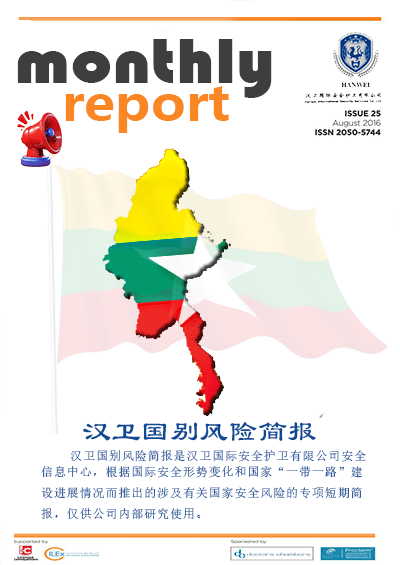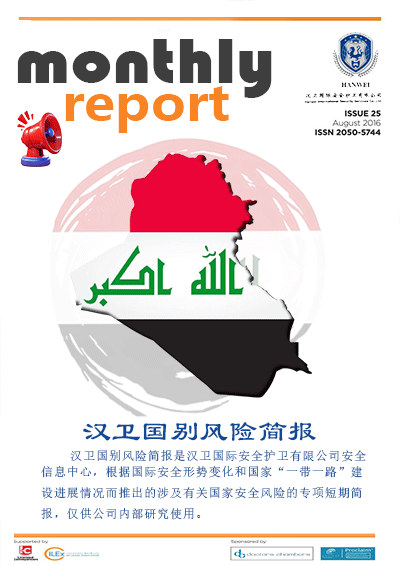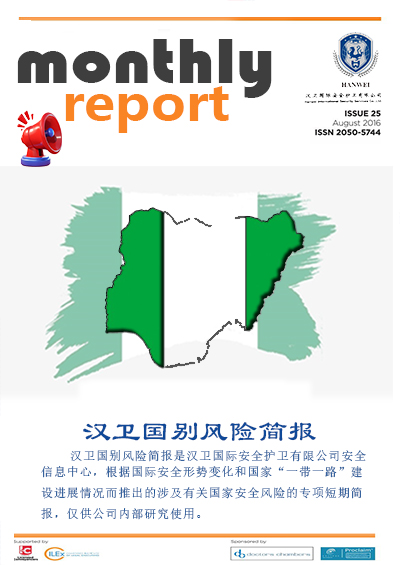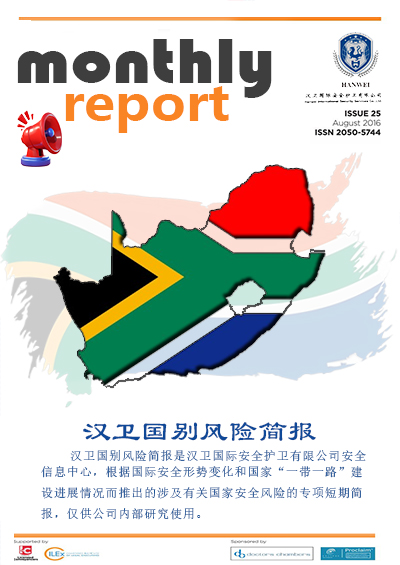Iraq Security Situation Review November
Researcher 006
According to monitoring reports from Hanwei International's security officers in Iraq and related media coverage, our company has documented nearly a hundred security incidents of various types this month, among which cross-border armed conflicts/armed attacks, terrorist attacks, shootings/murders, and tribal conflicts have had significant social impacts. This report primarily analyzes major social security incidents with substantial societal influence that may threaten the lives and property of Chinese citizens in Iraq, serving as a warning: Safety first when abroad!
Hanwei International analysis indicates that Iraq's social security situation this month is extremely severe, with the overall environment on the brink of a "war vortex."As in last month's report, the Lebanon-Israel conflict continues to escalate, with Iraqi militia groups represented by the "Islamic Resistance Organization" frequently launching attacks against Israeli and U.S. facilities. Recently, they have been using Syria as a base for long-range attacks on Israel, prompting Israel to threaten large-scale strikes on targets within Iraq itself, making the local security situation in Iraq highly precarious. Turkey has been continuously targeting the Kurdistan Workers' Party (PKK) in Iraq, citing attacks on its aerospace industries factory. As the Middle East situation becomes increasingly turbulent and weapons proliferate, ISIS terrorists may be regrouping. Iraq is actively conducting counter-terrorism operations to limit their activities and capabilities within its borders. Regarding social security incidents, shootings, murders, and tribal conflicts occur frequently, severely impacting community safety and property.
1. Iraqi militia groups continue attacking Israeli targets, provoking Israeli threats.
From September to October this year, Iraqi militia groups' raids increased by 150%; in November, attacks surged again, with 60 cruise missile and drone strikes launched against Israel in just 20 days. On November 1, the Islamic Resistance in Iraq (IRI) announced drone strikes on six key Israeli targets. On November 8, the group claimed a drone attack on a military base in northern Israel, reiterating its determination to intensify strikes on "enemy" positions and promising faster follow-up attacks. On November 14, it announced multiple drone strikes on critical facilities in northern Israel, vowing continued resistance. The Israeli military reported intercepting a second drone from Syria within 24 hours, believed to have originated from Iraq.
Earlier this month, a Saudi news website revealed that Israel had compiled a "target list" of Iran-backed armed factions in the Middle East, warning of strikes on their home countries if attacks continued. The article stated, "Information indicates Israel is monitoring and identifying targets linked to Iran-backed militias and the Iraqi government. Israel has sent warnings to Iraq urging control over militias to prevent Iran from using Iraqi territory as a battleground against Israel." "Israeli sources claimed the military is preparing large-scale strikes on Iraqi territory, identifying over 30 'legitimate' targets."
From January to November 2024, Israel conducted 152 strikes in Syria, hitting 273 targets including military bases, intelligence stations, weapon depots, command centers, and ammunition storage sites belonging to Iran, Hezbollah, and Iraqi Shiite militias, resulting in 352 resistance fighters killed and 305 wounded. On November 20, Israeli airstrikes on three military sites of Iraq's al-Quds Brigade in Syria killed 79 (including 22 from Iraq's al-Nujaba Movement, 4 Hezbollah members, and 53 pro-Iran Syrian fighters) and wounded 34. The targeted area near Palmyra's industrial zone housed families of pro-Iran Iraqi militias.
2. Iraq's borders remain unstable as Turkey continues targeting the PKK.
On November 14, Turkey's Defense Ministry announced results of its week-long operations against the PKK in Iraq and Syria, claiming 48 militants "neutralized." The PKK is a Kurdish militant group active in southeastern Turkey, northern Iraq, and northeastern Syria's mountainous regions.
Since early 2024, over 2,500 PKK militants have been killed. On November 5, Turkey announced eliminating 3 PKK members in Iraq's Metina region (Mount Matin). On November 9, a Turkish drone strike on a PKK vehicle in Khalil village, Amadiya district, Duhok province killed 3 including a senior commander. On November 10, Turkish forces attacked Sinjar Resistance Units linked to the PKK in Mount Sinjar. On November 13, 5 PKK members were killed in Iraq's Asos region. On November 17, 8 PKK-affiliated individuals were eliminated across Iraq and Syria. On November 5, Iraq's Border Guard Command announced plans to build a 100km concrete wall along the Anbar-Trebil border with Syria, extending to Rabia in Nineveh province—an unprecedented border control measure reflecting the Middle East's escalating tensions.
3. ISIS exploits regional chaos while Iraq intensifies counter-terrorism.
This month, our sources indicate ISIS activity primarily in Salahuddin and Kirkuk provinces. On November 1, Iraqi police detained ISIS suspects in eastern Salahuddin, seizing explosives. On November 12, Salahuddin police arrested 2 ISIS suspects and confiscated dozens of unregistered motorcycles, while Baghdad Operations Command arrested 12 suspects with illegal drones and weapons. Security forces also captured terrorists in Anbar, Basra, and Kirkuk, destroying hideouts. On November 16, Iraqi forces used warplanes to eliminate an ISIS stronghold in Kirkuk's Hamrin mountains, killing 4 militants. On November 25, Federal Police arrested terrorist Walid al-Dulaimi in Baghdad's Dora district for sectarian-motivated attacks and murders. On November 30, Iraq's F-16s conducted precision strikes in Kirkuk's Hamrin mountains, killing at least 5 ISIS members and discovering weapons/explosives. However, counter-terror operations saw casualties—on November 18, an explosion during a raid in eastern Salahuddin killed 3 senior officers and wounded 3 soldiers.
4. Frequent social security incidents: shootings/murders and tribal conflicts.
Shootings/Murders:On November 3, an army lieutenant colonel shot dead his neighbor during an argument in Baghdad's Kadhimiyah district. On November 4, a teacher in Najaf was murdered at home by unknown assailants. The same day, a security guard at a car dealership in Diyala's Hashimiyat area was shot dead during a robbery where expensive cars, cash, and surveillance equipment were stolen.
Tribal Conflicts:On November 8, Dhi Qar security forces intervened in a violent land dispute between tribes south of the provincial center. On November 19, two tribal clashes occurred in Dhi Qar and Muthanna provinces: the first in Dhi Qar's Aqeeqah town involved intra-tribal violence over old grievances; the second in Muthanna's "Island" area saw the "Safran" and "Barkat" tribes clash over land, leaving one security officer dead during mediation. Authorities arrested 58 suspects and seized 5 vehicles.
Recommendations for Chinese entities/individuals in Iraq:
Monitor China's consular service website for Iraq's "Travel Risk Levels and Security Alerts," enhancing safety awareness.Currently, Iraq faces extreme security risks with ISIS activity and Israeli threats against "legitimate" targets nationwide—particularly in Anbar, Salahuddin, Kirkuk, Nineveh, and Diyala provinces (extreme-risk zones). Chinese citizens should reconsider work travel to Iraq unless absolutely necessary. Note local regulations: carry valid IDs at checkpoints, respect religious customs, and avoid restricted areas/photography.
Emergency contacts: Iraq Police: 130; Ambulance: 105; China's 24/7 consular hotline: +86-10-12308/+86-10-65612308; Chinese Embassy in Iraq: +964-7901912315; Erbil Consulate: +964-7515477820; Basra Consulate: +964-7858618940.




